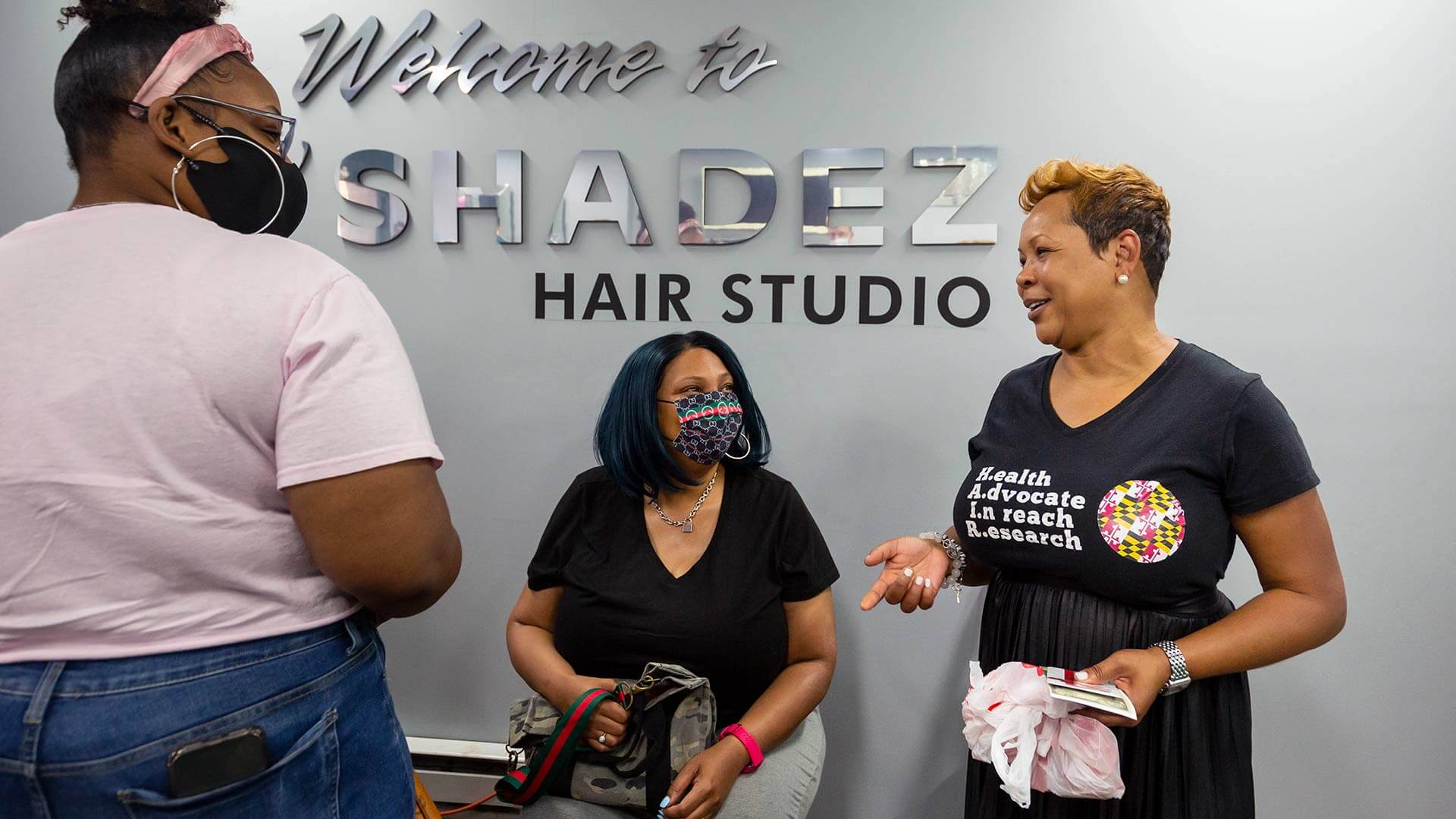- June 15, 2021
- By Chris Carroll
After Prince George’s County began its phased reopening last year, Joanne Long settled back into Katrina Randolph’s styling chair with relief. She’s been coming weekly to Tre Shadez in Capitol Heights, Md., for 15 years for the hair care and pampering along with the warm conversation and sense of community that pervades the salon.
Starting early this year, however, Randolph began raising a new topic of discussion—COVID-19 vaccination—and won’t let it drop.
“Trina’s kept working on me, so that’s why I’m here,” Long said on Monday, a day the salon is normally closed. That was when health care workers from Luminis Health provided COVID-19 vaccine shots to her and more than 30 other mainly Black and Latino local residents, some of whom wouldn’t have been there without the salon owner’s steady efforts.
 Randolph is one of three local stylists and barbers partnering with the University of Maryland’s Health Advocates in Reach and Research (HAIR) program. It’s mobilizing these trusted members of communities of color to promote health and bring needed change in places where “business as usual means people live sicker and die younger,” said Stephen Thomas, a professor of health policy and management and director of the Maryland Center for Health Equity who founded HAIR.
Randolph is one of three local stylists and barbers partnering with the University of Maryland’s Health Advocates in Reach and Research (HAIR) program. It’s mobilizing these trusted members of communities of color to promote health and bring needed change in places where “business as usual means people live sicker and die younger,” said Stephen Thomas, a professor of health policy and management and director of the Maryland Center for Health Equity who founded HAIR.
What started some 15 years ago as an effort to encourage preventative health care like cancer and blood pressure screenings was quickly re-outfitted early in the pandemic to fight myths and doubts about the the illness, testing and later, vaccination among racial and ethnic minority populations. In majority-Black Prince George’s County, vaccine hesitancy—along with real transportation difficulties for some low-income or older residents, Thomas pointed out—have contributed to less than half of the eligible population receiving at least one vaccine dose, compared to 72% statewide, according to the state’s coronavirus tracking website.
Now, in effect, HAIR is going nationwide, with President Joe Biden earlier this month announcing the launch of Shots at the Shop, an effort to train 1,000 barbers and stylists from Black, Latino and other communities to dispel myths about COVID-19 vaccination. UMD is sharing not only the inspiration for the program but also its expertise through the training platform and curriculum. Thomas sees the potential of making inroads in a variety of health issues driven by racial and economic disparities.
“We’re not at Six Flags doing vaccinations any longer, we’re now at the hyperlocal, and in some cases, we’re at the ‘hell, no’ wall for people,” Thomas said. The only way to overcome such resistance is by providing a relaxed, safe place for people to discuss their reservations about vaccination.
Mike Brown, lead barber at the Shop Spa in Hyattsville, which hosted the first HAIR-sponsored COVID-19 vaccine clinic in May, has been part of Thomas’s project for 11 years. He was first attracted to it out of an eagerness to fight colorectal cancer, which claimed his father.
Much like Randolph with her customers at Tre Shadez (where he was volunteering yesterday), Brown talks at length with his patrons about their distrust of big drug companies, politicians and news talking heads who push the vaccines—and he gets it.
“It’s a fact Black people haven’t been treated fairly throughout American history, and some of them are stuck there,” unable to accept a potentially life-saving treatment from a government that’s done little to ever help them or their neighborhoods, he said.
But through his own long association with Thomas and HAIR, Brown knows who he can trust to provide good health advice, and in turn, his status as a trusted voice in the community of his barbershop has helped persuade over half of his customers to get a shot.
Randolph said most of her own adult customers like Joanne Long eventually come around—their main reservations have to do with how fast a coronavirus vaccine was developed, particularly when compared with the long-running toll of chronic diseases so harmful among Black and Latino communities.
It’s the youngsters who are more of a challenge, she said.
“You hear things like, ‘They want to decrease the Black population,’ ‘They want to put a chip in you to track you,’—all kinds of crazy mess,” Randolph said. “They’re just going by what they hear on social media, and I try to encourage them that if they’re going to take any advice—because this is a life-and-death situation—at least get the information from the professionals.”
With the recent lowering of the minimum age for vaccination to 12, Randolph focused the vaccine clinic yesterday especially on children and teens. Jayla Monagan, 12, was one of the youngest to get a shot; her mother Bobbie, a health care worker, had earlier tried unsuccessfully to get her vaccinated at a Walmart, and was approached by volunteers about the clinic while using the post office across the street.
Although Bobbie Monagan sympathizes with people’s doubts, especially regarding the speed of vaccine development, she said, “Basically, I trust the science.” Later in the day she brought another child to be vaccinated.
Joanne Long came with her two granddaughters as well. One of them, Jaelyn Moses, 16, said she’d heard stories about terrible reactions to the vaccines, but eventually decided if her grandmother trusted Randolph and the vaccine, she could too.
“I was scared,” she said, “but I just got up this morning and decided I was going to do it.”
